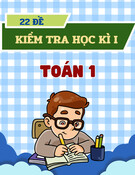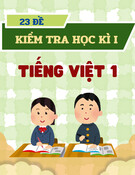
TẬP 1

TEST 1 | Unit 1, 2
Time: 15 minutes
I. Choose the best answer to complete the sentence.
1. As planned, I ______ my parents this weekend.
A. am going to visit B. visit C. will visit D. visiting
2. My mother often ______ the housework every day.
A. do B. is doing C. did D. does
3. He likes to meet and spend time with other people. He is very ______.
A. rude B. sociable C. unfriendly D. generous
4. _____are foods and other goods sold at a shop or a supermarket.
A. Housework B. Benefits C. Chores D. Groceries
5. He ______ books at the moment.
A. reads B. reading C. read D. is reading
II. Change the following sentences into passive voice.
6. He must do the homework now.
……………………………………………………….
7. Nobody saw him yesterday.
……………………………………………………….
8. People are watching this football match all over the world.
……………………………………………………….
9. Does your sister clean the house every day?
……………………………………………………….
10. Who looked after your daughter last night?
……………………………………………………….

TEST 2 | Unit 1,2
Time: 15 minutes
I. Choose the best answer to complete the sentence.
1. The house ______ next year.
A. will build B. will be built C. is going to build D. is built
2. There are many ______ when we often take morning exercise.
A. duties B. benefits C. burdens D. chores
3. They should contribute an enormous amount of money _____ the charity.
A. to B. for C. with D. of
4. ______ is a large organ in the body which cleans the blood.
A. Lung B. Brain C. Liver D. Heart
5. You _____ to read from an eye chart to check whether your eyes are good or not.
A. will probably ask B. are going to ask
C. will be asked D. asked
6. The government should take actions _____ the Zika virus from spreading.
A. to prevent B. to preventing C. prevented D. prevents
7. I was obese because I didn't have a(n) ______ diet.
A. healthy B. unhealthy C. health D. healthily
8. Parents should ______ hands to take care of their children well.
A. shake B. hold C. join D. take
9._____ sure that you follow the instructions carefully.
A. Believe B. Try C. Do D. Make
10. This flat ______every day.
A. is cleaned B. cleans C. is cleaning D. cleaned
II. Put the following verbs into the correct form.
11. Don't make so much noise. The students (do) ______ the test.
12. The window should (repair) ______ by my brother.

TEST 3 | Unit 1,2
Time: 15 minutes
I. Choose the word whose underlined part is pronounced differently from the rest.
1. A. breath B. health C. heart D. head
2. A. household B. bone C. oxygen D. role
II. Choose the best answer to complete the sentence.
3. As planned, we ______ a new house next week.
A. are going to build B. build C. will build D. built
4. My father is responsible ______ making money.
A. in B. with C. at D. for
5. I am afraid my brother can't go out with you right now. He ______ his car.
A. repair B. repairs C. repaired D. is repairing
6. The heart and blood vessels are parts of the ______ system.
A. certain B. circle C. circulatory D. circumstance
7. The nerves _______ messages between your brain and the rest of your body.
A. carry B. are carrying C. carried D. will carry
III. Read the passage and choose the best answer.
There are many things in life which you have to do whether you like it or not. One of such things is
household (8) ______. It is what someone in the family has to do every day in spite of his or her wish and
desire. You can hardly find a person (9) _____ doesn't like comfort, delicious food, clean and tidy
clothes. But these things need somebody's attention and doing them. It's called housework.
I think it is not a bad idea to (10) ______ household duties. If every (11) ______of the family does his
bit about the housework, it isn't difficult or boring and proves the proverb: "Many hands make light
work". For example, the children should keep their own rooms (12) ______, make their beds, lay the table
for meals, clear away the dishes and wash up. The mother could then concentrate on the more specialized
jobs of cooking, ironing, mending, and shopping. The father should do more difficult physical work. This
is an ideal variant for me how to keep house.
8. A. responsibilities B. chores C. groceries D. laundries
9. A. who B. whom C. which D. where
10. A. keep B. do C. make D. share
11. A. son B. daughter C. member D. parent
12. A. tidy B. mess C. dirty D. disorder







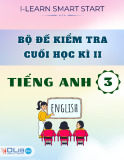
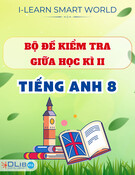
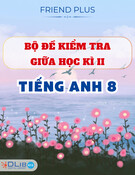
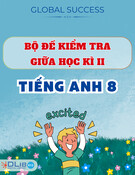
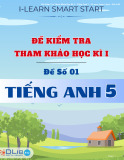

![Đề thi Tiếng Anh có đáp án [kèm lời giải chi tiết]](https://cdn.tailieu.vn/images/document/thumbnail/2025/20250810/duykpmg/135x160/64731754886819.jpg)
